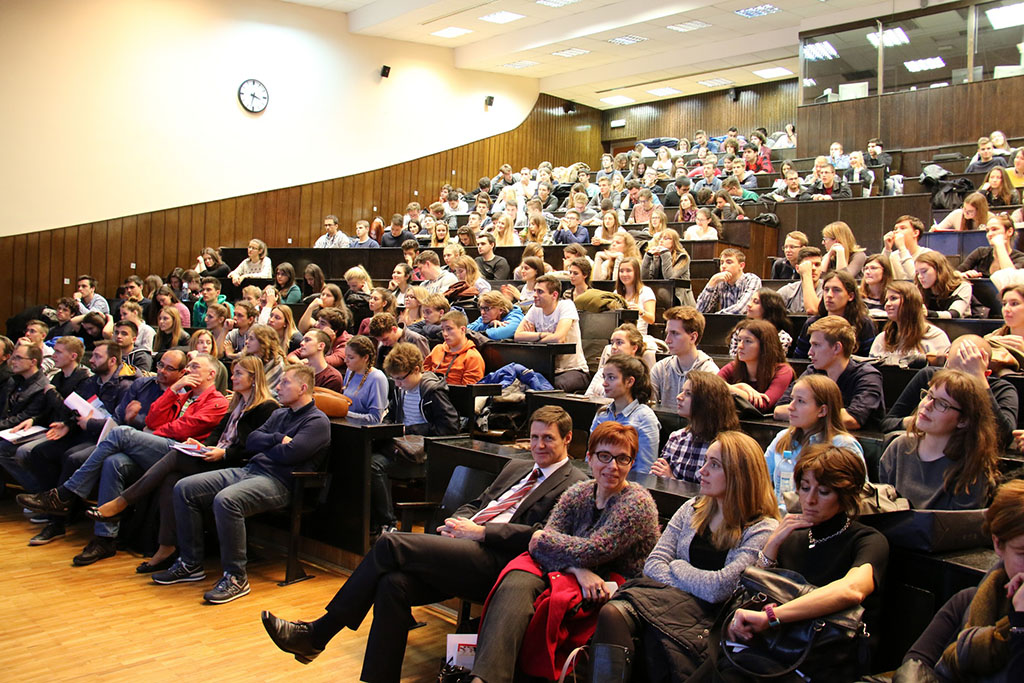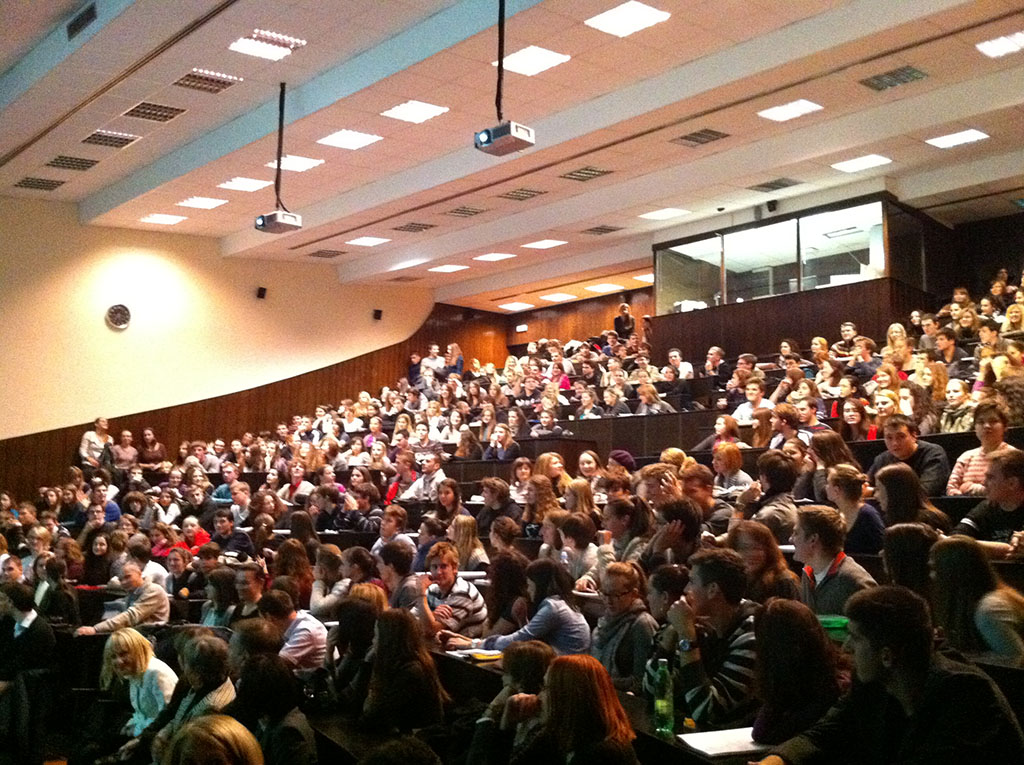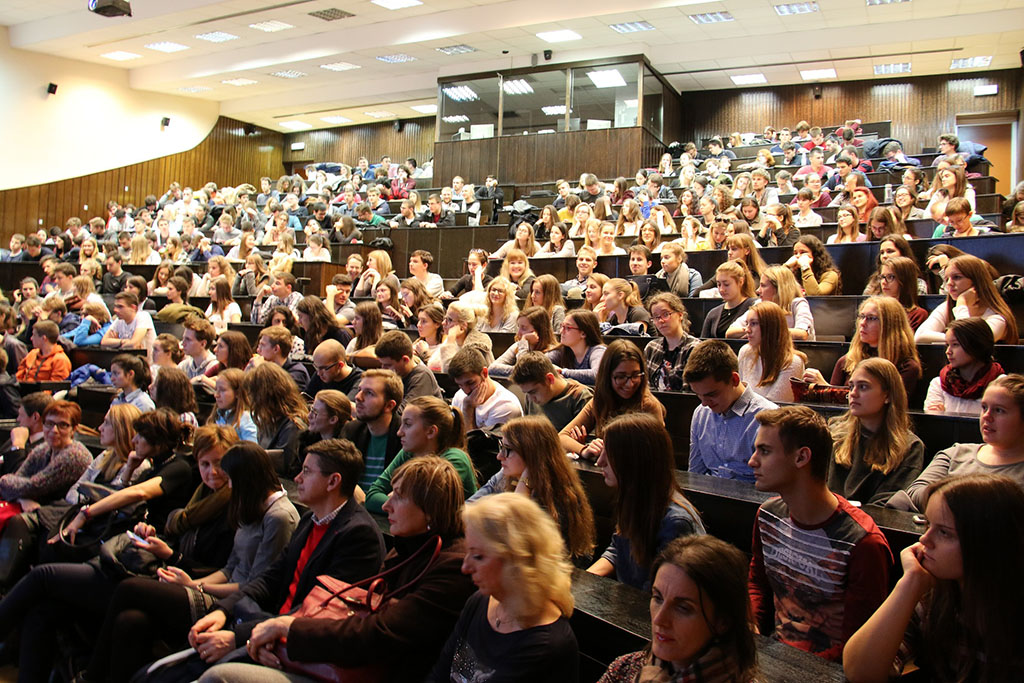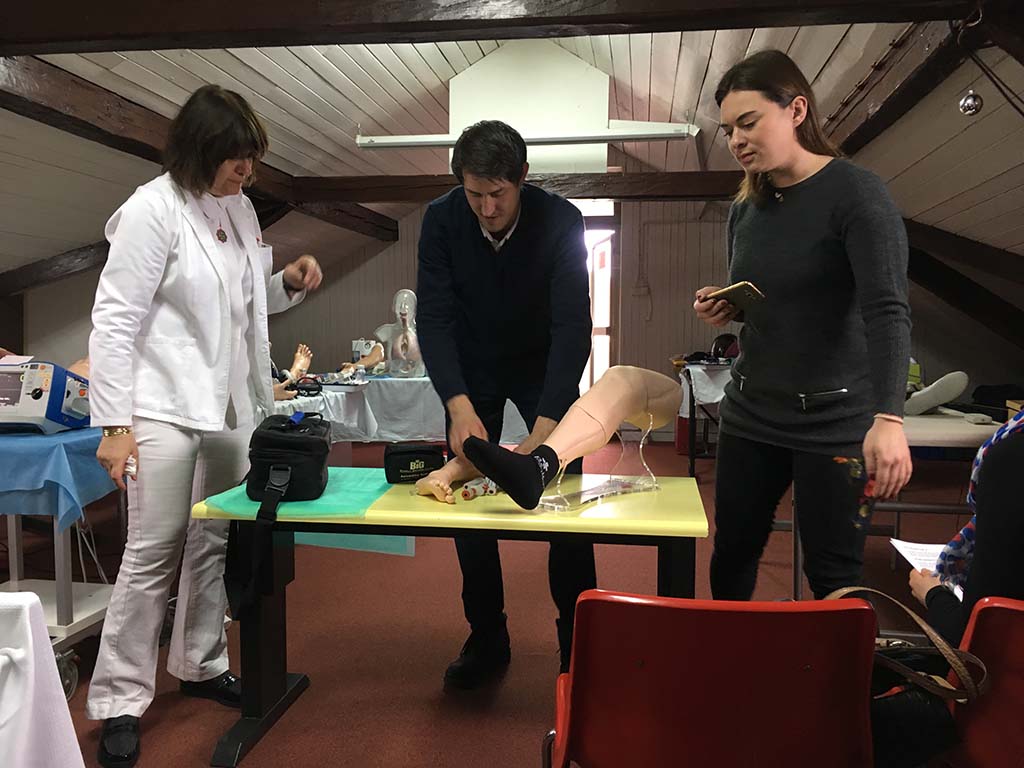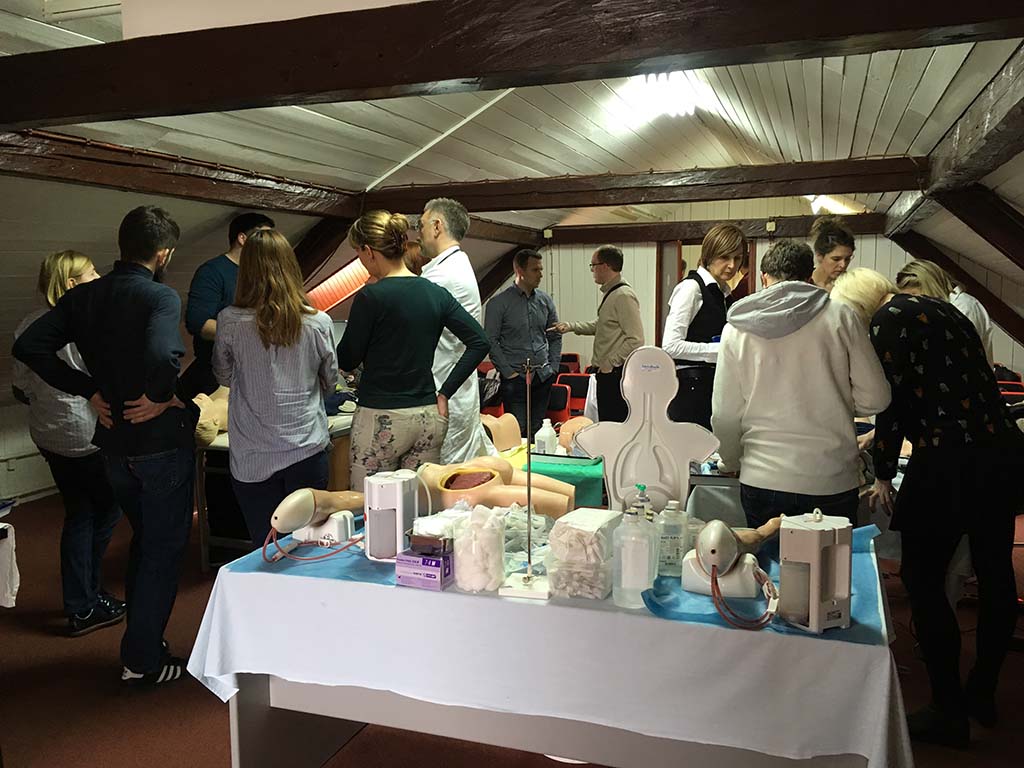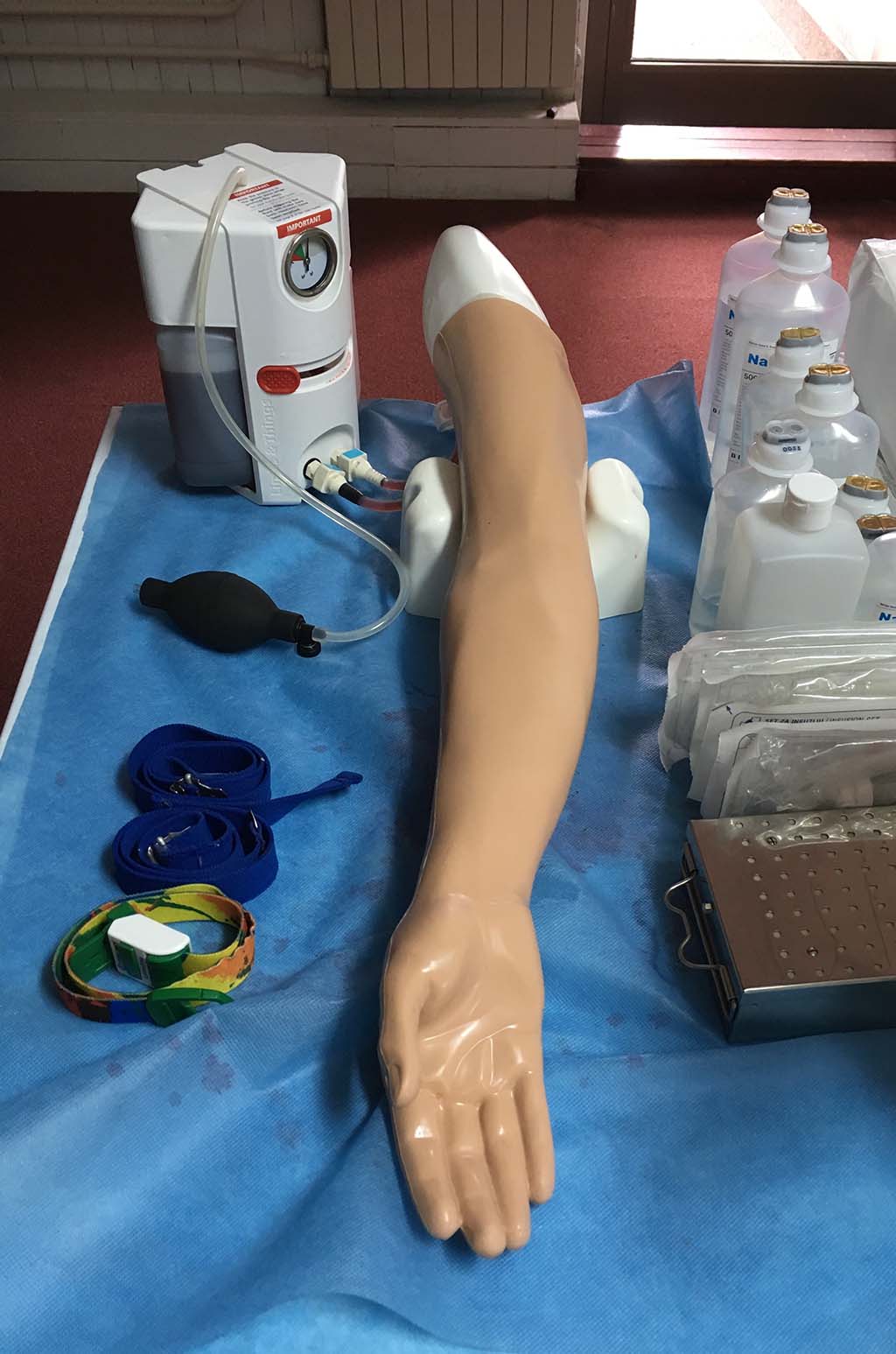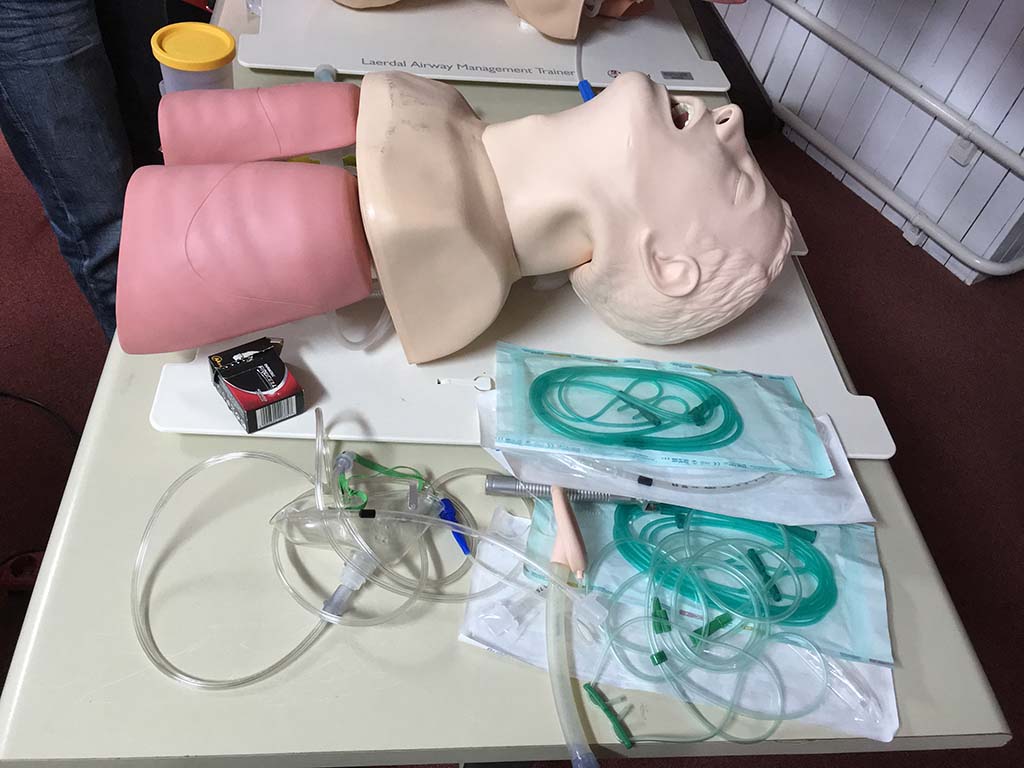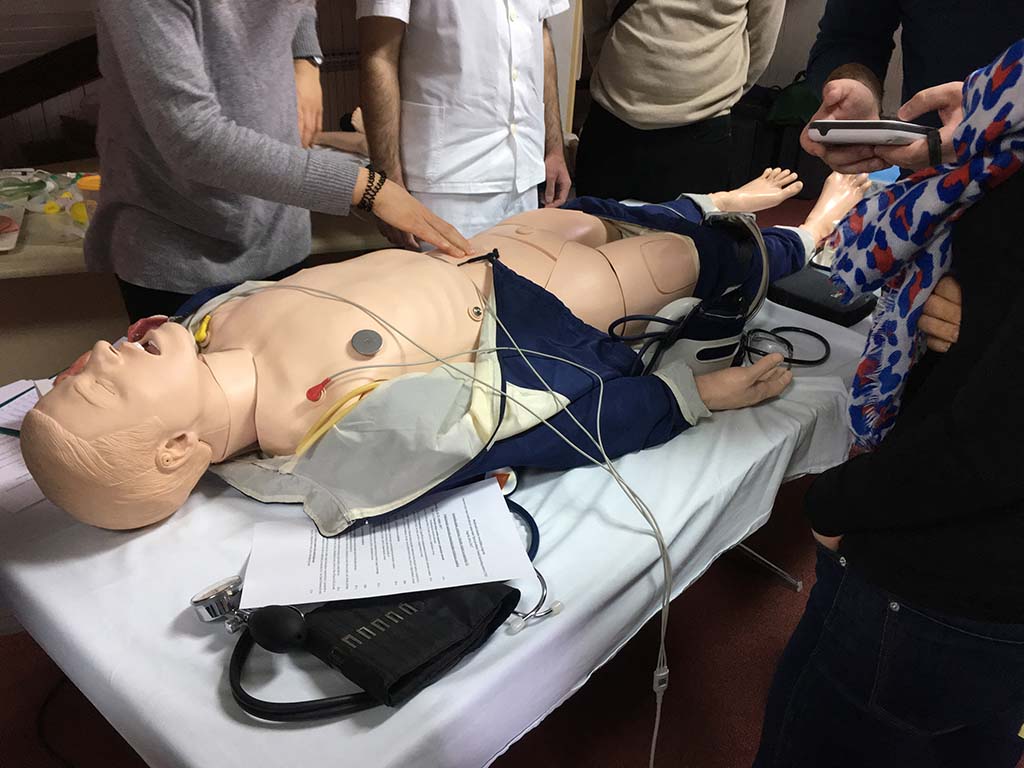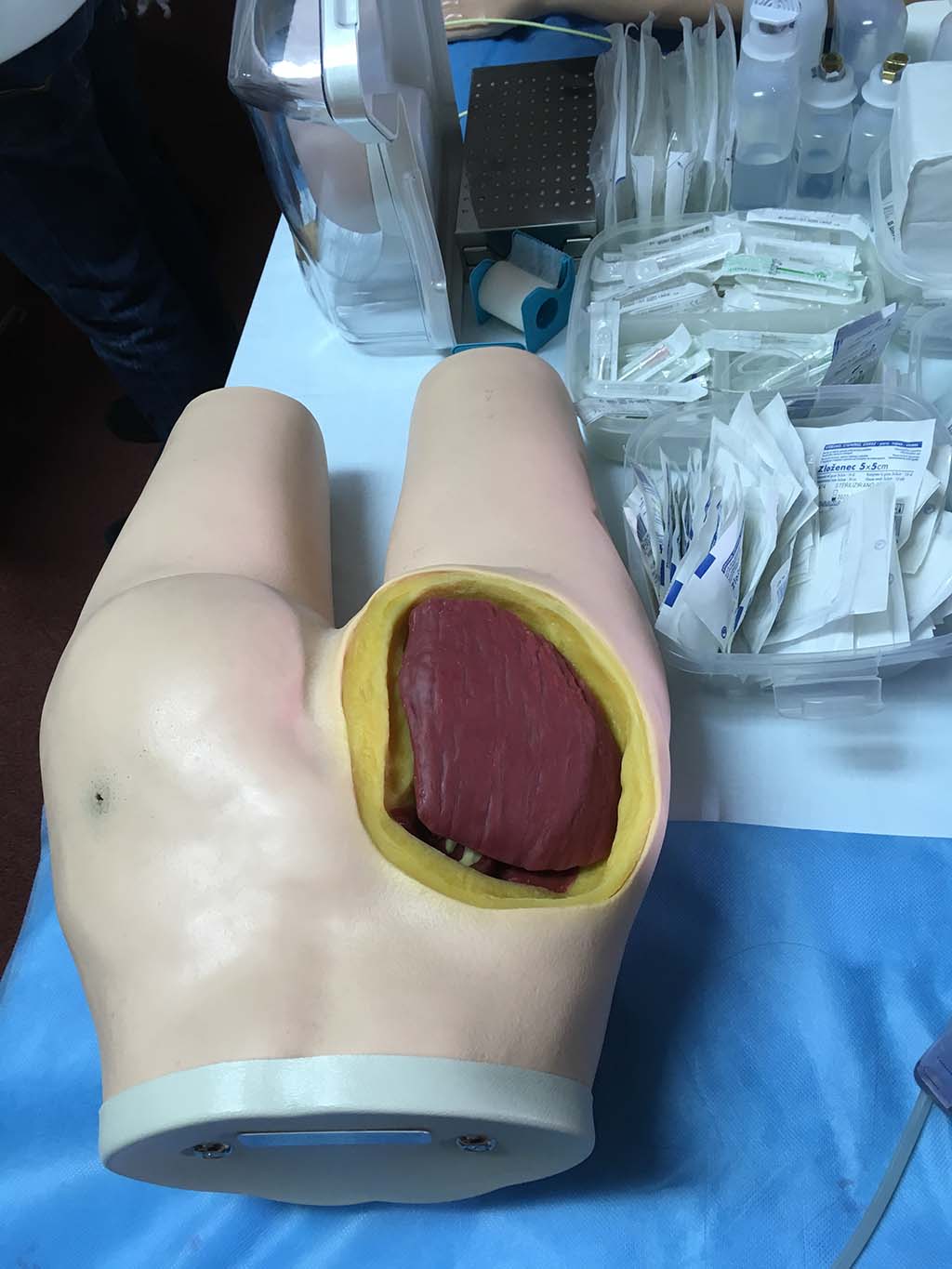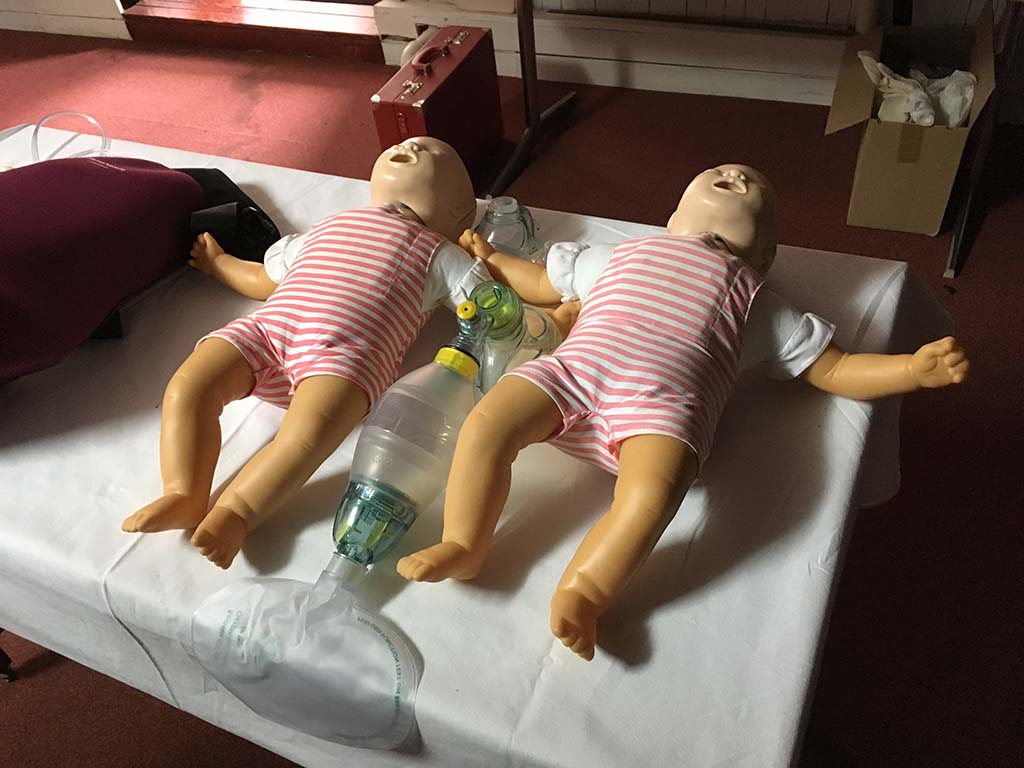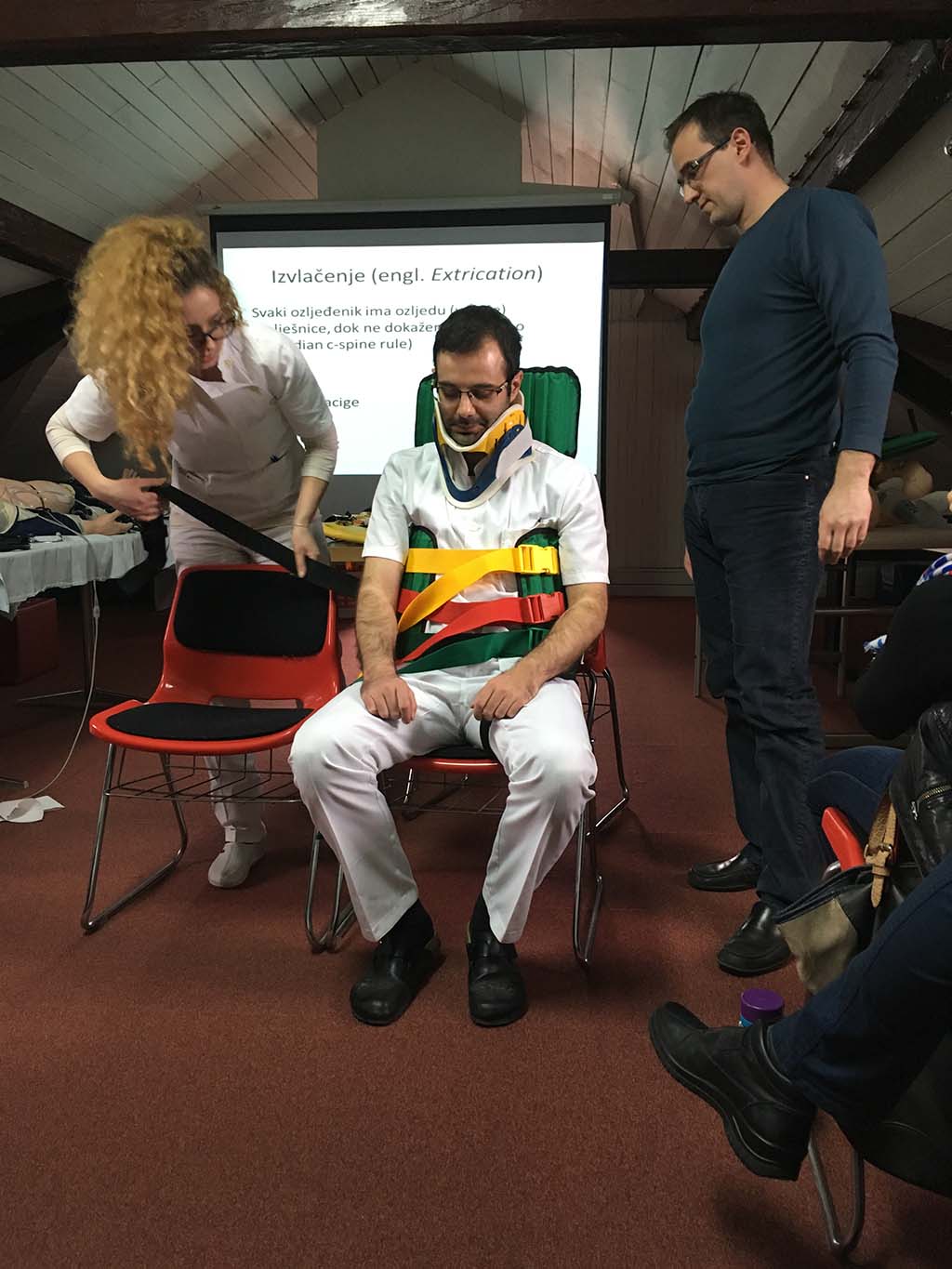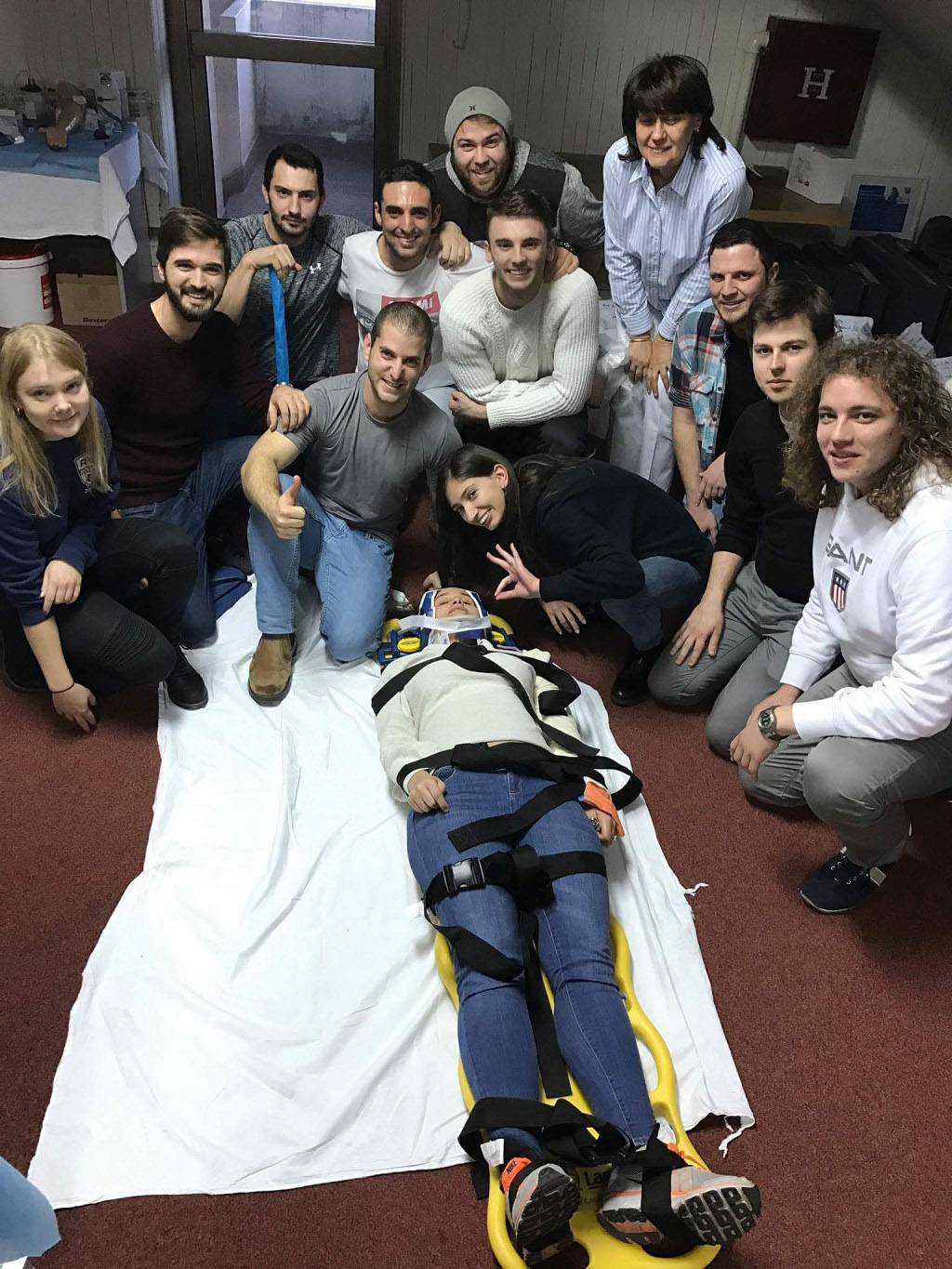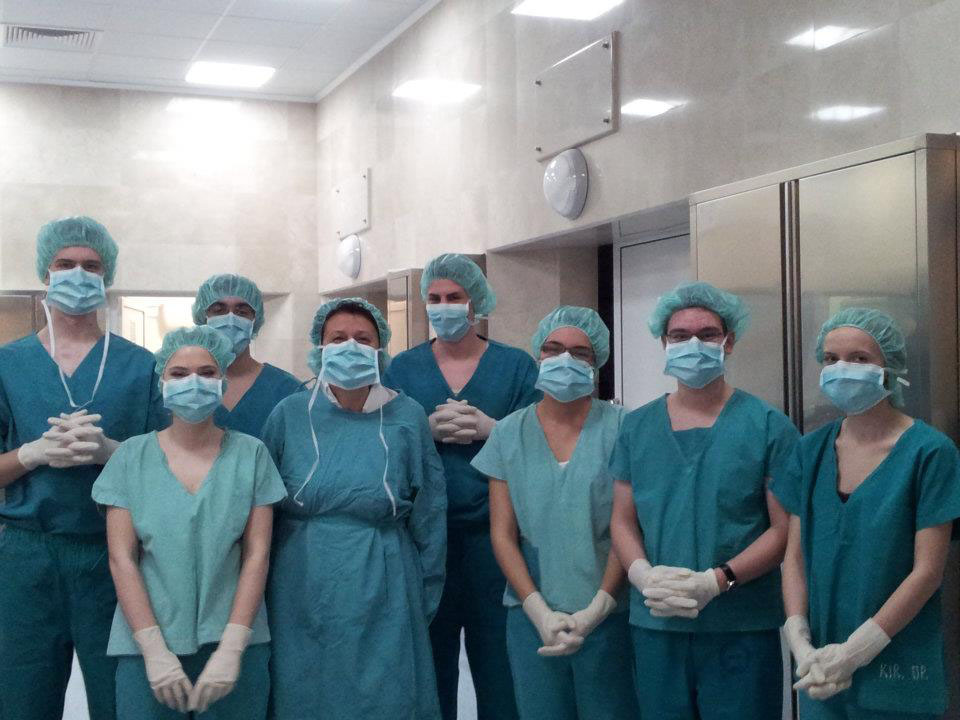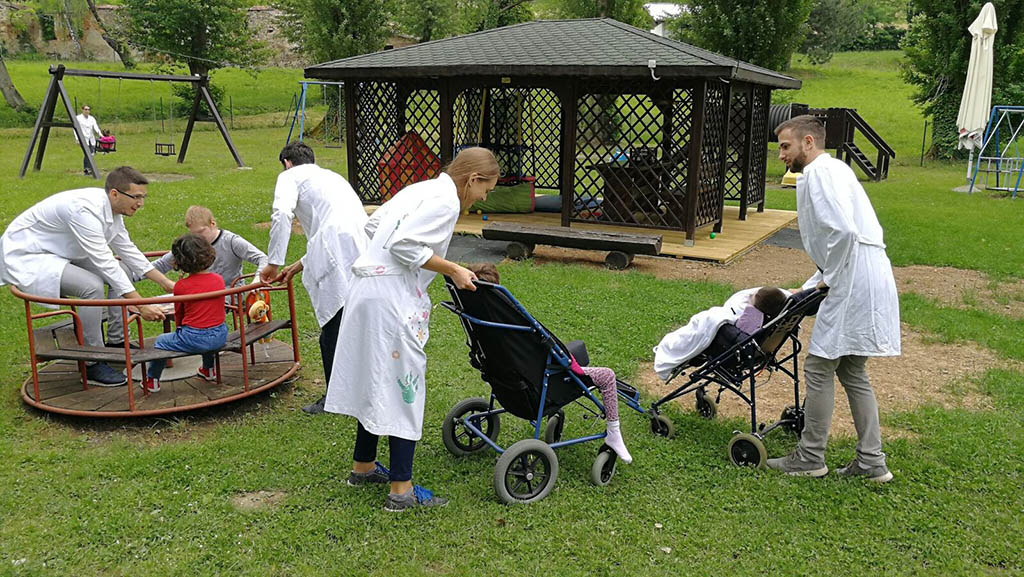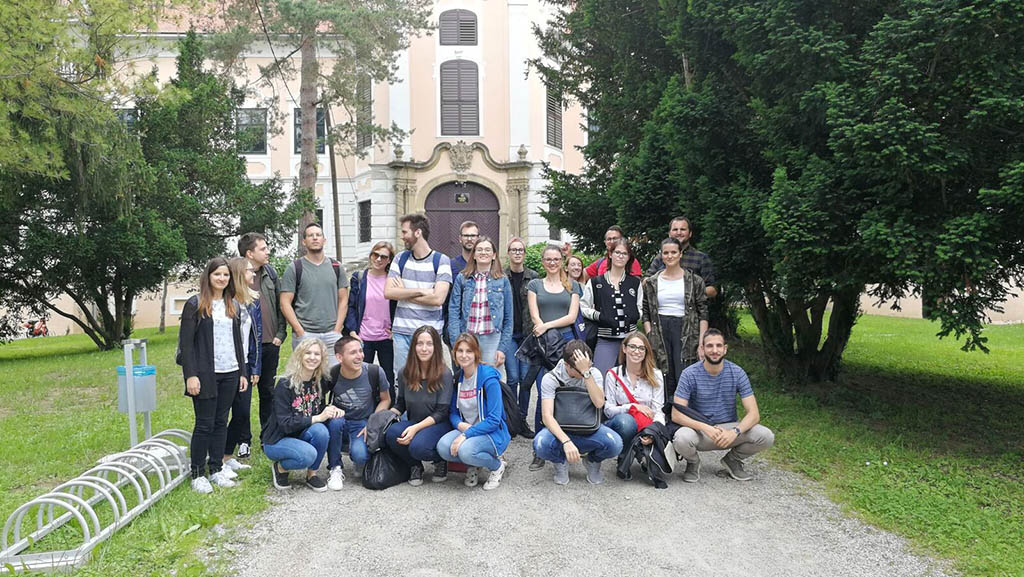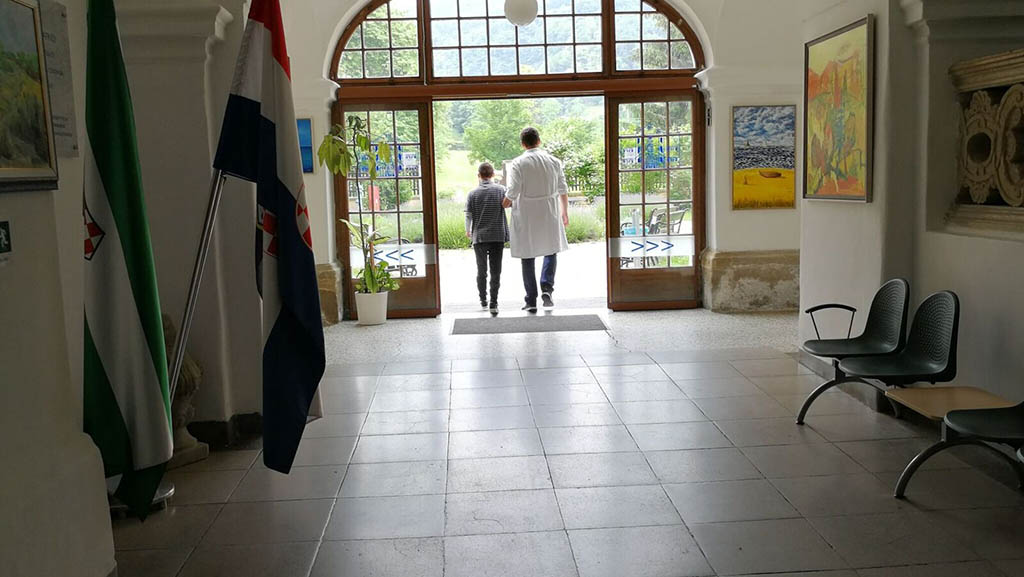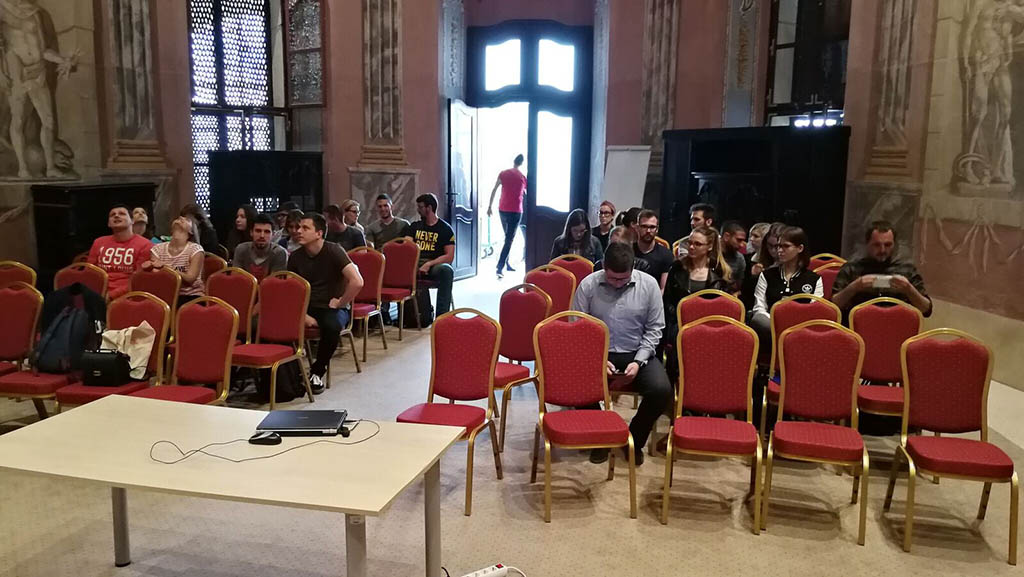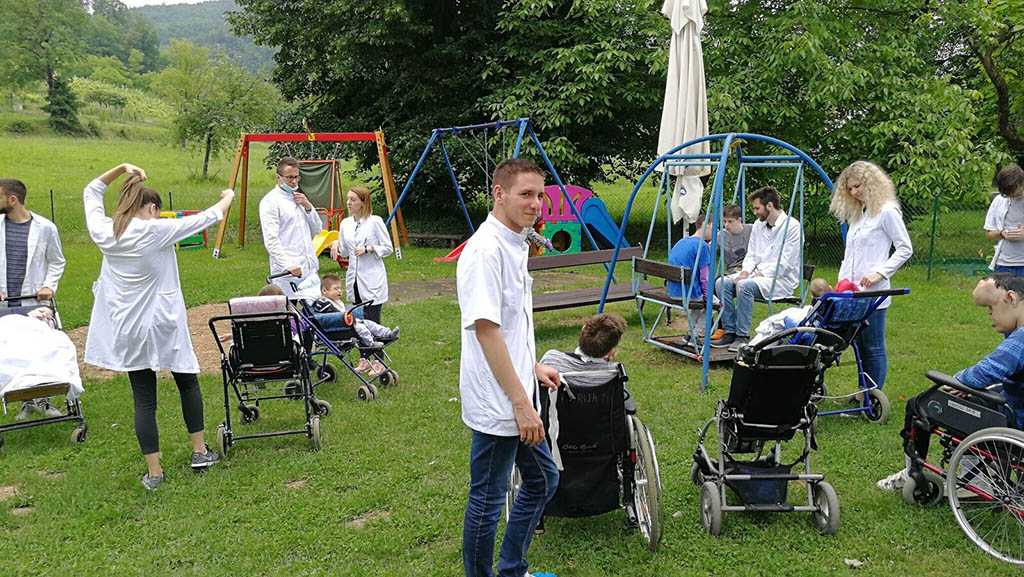The Fundamentals of Medical Skills (FMS) is a longitudinal course taught throughout the entire study, from the first to the sixth year.
The course includes two essential skill areas: Clinical and practical skills and Communication skills.
From the beginning of their studies, the students encounter practical and clinical skills, the hospital environment, patients, and learn about emergencies, providing first aid, and basic life support with exercises on models. Several practical skills are learned and practised through the course, mostly related to other clinical teaching. Already from the first year of study, our students acquire knowledge and skills of medical personal protection, providing first aid, basic life support, measuring blood pressure and other vital indicators, drawing blood, giving injections and infusions, handling catheters in body cavities and spaces, measuring blood sugar, stopping bleeding, immobilization at the level of first aid, procedures in anaphylaxis and anaphylactic shock, defibrillation procedures with manual and automatic defibrillators, airway care, mask and balloon ventilation, endotracheal intubation and ventilation, advanced life support measures and techniques, providing emergency care to children, and delivery in outpatient settings. At the end of the studies, in addition to practical and clinical skills, the students are exposed to learning using simulators and scenarios of the most common emergency clinical conditions in the domain of a graduated doctor. One of the goals of the course is to teach life support skills to students from the first to the sixth year of study. Competence acquisition from basic life support at the beginning of studies to advanced life support in the sixth year of studies follows the standards of the European Resuscitation Council (ERC).
The basics of communication skills begin to be acquired from the first year of study and prepare students to develop communication in situations and examples from clinical courses in other years of medical studies. In the second year, the skills of communication in the medical interview are acquired; in the third year, there are exercises in data presentation and processing in order to obtain the informed consent of a patient and peculiarities of communication during teamwork. During the clinical years of study, the peculiarities of communication related to the clinical content, communicating difficult news, communicating with a sick child and the parents of a sick child, and with pregnant women are taught. In the fifth year of study, the classes are organized at the Special Hospital for Children in Gornja Bistra. During FMS 6 in the last year of study, the acquired knowledge and skills are revised, the peculiarities of professional communication and communication obstacles are defined, and the rules of communication with other sectors and media are introduced. Teaching materials are distributed to students during classes.
The FMS course programme was formed according to the plan and teaching programme for individual years of study, and it follows the basic courses and the acquisition of the overall medical knowledge during study.
Course structure
Lectures hours: 0
Seminar hours: 0
Exercises hours: 30 h
Total hours: 30
The teaching is illustrated by the Manual of Practical and Clinical Skills for Medical Students, which is available as an e-book on the LMS system.
The classes are held continuously for 15 weeks, once a week for 90 minutes. Students are divided into groups of 10 students in alphabetical order. The same group retains its structure until the sixth year of study. The same group leader accompanies the students for six years. The leaders are doctors of various medical professions, specialists or residents.
Knowledge exam
After classes are completed at the end of each academic year, an exam designed according to the principles of an objectively structured clinical examination (OSCE) is conducted with three stations where the students' acquired practical clinical and communication skills are checked and evaluated.
Teaching of the FMS course for the first generation of students began in the academic year 2011/12. The teaching program also includes the Continuing Medical Education course for the FMS teachers.
FMS Course Council
The Head of the FMS Course Council is Associate Professor Boris Filipović Grčić, MD, PhD
The coordinator for Communication Skills is Associate Professor Marijana Braš, MD, PhD
The Course Council members:
Professor Vesna Degoricija, MD, PhD
Professor Boris Filipović Grčić, MD, PhD
Associate Professor Marijana Braš, MD, PhD
Associate Professor Venija Cerovečki, MD, PhD
Associate Professor Ivan Gornik, MD, PhD
Professor Tomislav Luetić, MD, PhD
Professor Ratko Matijević, MD, PhD
Associate Professor Ph.D. Anna Mrzljak, MD, PhD
Associate Professor Matias Trbušić, MD, PhD
Professor Zrinka Bukvić- Mokos, MD, PhD; Vice-dean for graduate studies
UHC Sestre Milosrdnice
Sestre Milosrdnice University Hospital Center
Vinogradska cesta 29, 10000 Zagreb, CroatiaVelimir Altabas, MD, PhD
Asst. Prof. Jakov Ajduk, MD, PhD
Assoc. Prof. Zdravko Babić, MD, PhD
Asst. Prof. Doc. Neven Baršić, MD, PhD
Zdenko Bilić, MD
Alen Biščanin, MD, PhD
Asst. Prof. Marijana Bosnar Puretić, MD, PhD
Matea Crnković Ćuk, MD
Prof. Vesna Degoricija, MD, PhD
Lidija Dežmalj Grbelja, MD, PhD
Duško Dobrota, MD
Sanda Dokoza Terešak, MD
Ivka Djaković, MD, PhD
Luka Djulabić, MD
Björn Dario Franjić, MD
Vesna Gall, MD, PhD
Goran Glavičić, MD
Karlo Golubić, MD
Ozren Grgić, MD, PhD
Tonko Gulin, MD, PhD
Marija Gomerčić Palčić, MD, PhD
Amir Ibukić, MD
Ivan Jakšić, MD
Hrvoje Kniewald, MD
Iva Klobučar, MD
Dominik Kralj, MD
Karlo Kobzi, MD
Prof. Arijana Lovrenčić-Huzjan, MD, PhD
Tihana Magdić Turković, MD, PhD
Ines Potočnjak, MD, PhD
Marin Pavlov, MD, PhD
Marija Pastorčić Grgić, MD, PhD
Tomislav Radočaj, MD, PhD
Mihael Ries, MD, PhD
Asst. Prof. Marina Roje Bedeković, MD, PhD
Senka Sabolović Rudman, MD, PhD
Boris Stubljar, MD
Sanja Stojsavljević, MD
Tomislav Tomičević, MD
Asst. Prof. Matias Trbušić, MD, PhD
Kristina Trnjar, MD
Tea Varjačić, MD
Marinko Vučić, MD, PhD
Ozren Vinter, MD
Jere Žarko, MD
Lovro Lamot, MD, PhD, dr.med
Tena Trbojević, MD
Marija Požgaj Šepec, MD
Andro Košec, MD, PhD
Ana-Meyra Potkonjak, MD
Ana Penezić, MD, PhD
Ivan Bolanča, MD, PhD
Josipa Josipović, MD, PhD
Sandra Baranović, MD
UHC Zagreb
Rebro
Kišpatićeva ul. 12, 10000, Zagreb, CroatiaŠalata
Šalata ul. 4, 10000, Zagreb, CroatiaJordanovac
Jordanovac ul. 104, 10000, Zagreb, CroatiaPetrova
Petrova 13, 10000, Zagreb, CroatiaBožidarevićeva
Božidarevićeva ul. 11, 10000, Zagreb, CroatiaGundulićeva
Gundulićeva ul. 5, 10000, Zagreb, CroatiaTeachers
Prof. Boris Filipović Grčić, MD, PhD
Ivan Adamec, MD, PhD
Mirna Natalija Aničić, MD
Matija Bakoš, MD
Marija Bakula, MD, PhD
Ivan Bambir, MD
Maja Ban, MD
Asst Prof. Danijela Bandić Pavlović, MD, PhD
Maja Baretić, MD, PhD
Barbara Barun, MD, PhD
Josip Batinić, MD, PhD
Asst. Prof. Luka Bielen, MD, PhD
Assoc. Prof. Marina Boban, MD, PhD
Branko Bogdanić, MD, PhD
Prof. Marija Bošnjak Pašić, MD, PhD
Asst. Prof. . Marko Brinar, MD, PhD
Branka Bunoza, MD
Luka Crnošija, MD
Tomislav Ćaleta, MD
Lana Desnica, MD, PhD
Dora Fabijanović, MD
Tereza Gabelić, MD, PhD
Assoc. Prof. Ivan Gornik, MD, PhD
Marina Grubić, PhD prof.psiholog
Damir Halužan, MD, PhD
Saša Jevtović, MD, PhD
Hrvoje Jurin, MD
Sandra Karanović, MD, PhD
Lea Katalinić, MD
Adis Keranović, MD
Alan Kvarantan, MD
Ivan Lehman, MD
Dinka Lulić, MD
Nedo Marčinković, MD
Tomislav Meštrović, MD, PhD
Lea Miklić, MD
Ivica Mokos, MD, PhD
Asst. Prof. Predrag Pavić, MD, PhD
Asst. Prof. Zinaida Perić, MD, PhD
Danijela Petković Ramadža, MD
Marko Petrovečki, MD
Ivo Planinc, MD
Vedran Premužić, MD, PhD
Dražen Pulanić, MD, PhD
Asst. Prof. Mislav Puljević, MD, PhD
Bojana Radulović, MD, PhD
Vlatka Rešković Lukšić, MD
Iva Rukavina, MD, PhD
Asst. Prof. Jure Samardžić, MD, PhD
Fran Seiwerth, MD
Asst. Prof. Irena Senečić-Čala, MD, PhD
Juraj Slipac, MD
Ljiljana Smiljanić Tomičević, MD
Zrinko Šalek, MD
Assoc. Prof. Lana Škrgatić, MD, PhD
Jasna Špiček Macan, MD, PhD
Daška Štulhofer Buzina, MD, PhD
Assoc. Prof. Dinko Tonković, MD, PhD
Katarina Ivana Tudor, MD
Asst. Prof. Vedran Velagić, MD, PhD
Ana Vujaklija Brajković, MD, PhD
Ivana Vuković Brinar, MD, PhD
Asst. Prof. Ivana Zadro, MD, PhD
Tomislav Žigman, MD, PhD
Karin Zibar Tomšić, MD, PhD
Luka Filipović-Grčić, MD, dr.med
Ivanka Kos, MD
Vanja Ivković, MD, PhD
Zvonimir Ostojić, MD
Borka Pezo Nikolić, MD, PhD
Tamara Vukić, MD, PhD
Asst. Prof. Zrnka Kovačić Petrović, MD, PhD
Sandra Jakšić Jurinjak, MD, PhD
Maja Baretić, MD, PhD
Boris Bumber, MD
Filip Mustač, MD
Nina Jakuš, MD
Nevenka Cigrovski, MD
University Hospital Merkur
University Hospital Merkur
Zajčeva 19, 10000 Zagreb, CroatiaTeachers
Assoc. Prof. Anna Mrzljak, MD, PhD
Prof. Ratko Matijević, MD, PhD
Melita Buljan, MD, PhD
Daniel Martin Jakus, MD
Darko Kučan, MD
Inga Mandac Rogulj, MD
Matija Marković, MD
Maja Mijić, MD
Jadranka Pavičić Šarić, MD, PhD
Ivica Premužić Meštrović, MD, PhD
Assoc. Prof. Ingrid Prkačin, MD, PhD
Asst. Prof. Delfa Radić Krišto, MD, PhD
Nikola Sobočan, MD, PhD
Sandra Stasenko, MD, PhD
Luka Vučemilo, MD, PhD
Ksenija Vučur, MD
Viktor Zatezalo, MD
Petra Dinjar Kujundžić, MD
Bojana Šimunov, MD, MSc
Dubrava University Hospital
Dubrava University Hospital
Avenija Gojka Šuška 6, 10000 Zagreb, CroatiaTeachers
Ana Gudelj Gračanin, MD, PhD
Vanja Hulak Karlak, MD
Vanja Ivanović Mihajlović, MD
Sandra Jakšić Jurinjak, MD
Asst. Prof. Snježana Kaštelan, MD
Zdravko Mitrović, MD, PhD
Lea Šalamon, MD
Mario Udovičić, MD, PhD
Đana Vanjak Bielen, MD
Franjo Rudman, MD, PhD
Andrija Štampar School of Public Health
Andrija Štampar School of Public Health
Johna Davidsona Rockfellera 4, 10000 Zagreb, CroatiaTeachers
Prof. Ana Borovečki, MD, PhD
Asst. Prof. Venija Cerovečki Nekić, MD, PhD
Asst. Prof. Miroslav Hanževački, MD, PhD
Assoc. Prof. Zlata Ožvačić Adžić, MD, PhD
Asst. Prof. Goranka Petriček, MD, PhD
Asst. Prof. Neda Pjevač, MD, PhD
Dragan Soldo, MD
Asst. Prof. Tea Vukušić Rukavina, MD, PhD
University Hospital Sveti Duh
University Hospital Sveti Duh
Ul. Sveti Duh 64, 10000, Zagreb, CroatiaTeachers
Miro Bakula, MD, PhD
Asst. Prof. Edvard Galić, MD, PhD
Asst. Prof. Tatjana Goranović, MD, PhD
Ante Ivkošić, MD, PhD
Ana Jadrijević Štefek, MD
Nives Ljubić, MD, PhD
Ivana Mikačić, MD, PhD
Assoc. Prof. Višnja Nesek Adam, MD, PhD
Marko Sever, MD, PhD
Ivana Srzić, MD
Asst. Prof. dr. Jozica Šikić, MD, PhD
Domagoj Rašić, MD
Nikolina Marić, MD
Nikolina Schatzl, MD
University Hospital for Infectious Diseases Dr. Fran Mihaljević
University Hospital for Infectious Diseases Dr. Fran Mihaljević
Mirogojska cesta 8, 10000 Zagreb, CroatiaTeachers
Asst. Prof. Rok Čivljak, MD, PhD
Branko Miše, MD, MSc
Neven Papić, MD, PhD
Šime Zekan, MD, PhD
Educational Institute of Emergency Medicine of the City of Zagreb
Educational Institute of Emergency Medicine of the City of Zagreb
Heinzelova 88, 10 000 Zagreb, CroatiaTeachers
Silvija Hunyadi-Antičević, MD, PhD
School of Medicine
Other locations
Other locations
Teachers
Prof. Jasna Mesarić, MD, PhD
Lessons
Lessons - Practical skills
Lessons - Hospital Gornja Bistra
Božica Kereta
Marica Božurić
